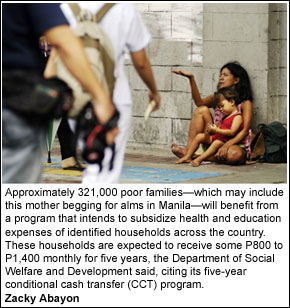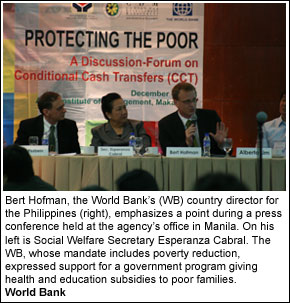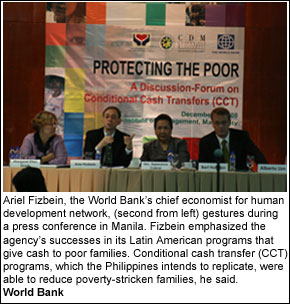MANILA, Philippines - The Philippines intends to borrow as much as P25 billion from the World Bank to fund a program that will subsidize health and education expenses of poor families. Under the government’s proposed five-year conditional cash transfer (CCT) program, 321,000 poor families will receive at least P800 monthly. Of this amount, P500 will be for their health and nutrition expenses while the remaining P300 will be for educational expenses over a ten-month school year, the Philippines’ Department of Social Welfare and Development said. The program’s benefits will go to households whose children up to five years old will be required to undergo regular health check-ups and vaccinations. The program—called Pantawid Pamilyang Pilipino Program (4Ps)—will also benefit families as long as their kids from three to five years old and six to 14 years old attend day care and formal schooling at least 85 percent of the time. Parents will also be required to attend pre-natal care sessions for pregnant women and participate in the government’s Parent Effectiveness Seminars and Responsible Parenthood Seminars. The conditions attached to the CCT is expected to cut the country’s mortality rates in infants, children, and mothers; arrest malnutrition which causes stunted growth in children; decrease the drop-out rate and increase the completion rate for basic and secondary education for children; and combat child labor. The government considers the amount as an investment in human capital as it is geared towards improving the health and intellect of poor Filipinos both in the urban and rural areas. The program is not a dole-out to the poor as the conditions attached to getting the benefit “enhances the role of parents and helps them accomplish their duties and responsibilities to their children," DSWD Secretary Esperanza Cabral said during a CCT forum at the Asian Institute of Management on Thursday. “The program encourages them to invest in the future, in particular in the health and education of their children and in the nutrition and food for their families," she added. The program is just one of many government efforts to lessen the impact of high prices on poor families. Besides selling rice at lower than market rates, the government also provided electricity subsidies worth P500 to households consuming less than 100 kilowatt hours per month. At least 4.5 million have claimed their one-time power subsidy, the DSWD said in October. The subsidies were collected from value-added taxes.
Next: RP the first in East Asia to seek funding for cash transfer program RP the first in East Asia to seek funding for cash transfer program The Philippines is the first East Asian country to seek the World Bank's financial support for a CCT program, country director Bert Hofman said. "We think the loan is very useful. We're open to it. We want to support the program," Hofman told reporters after the forum. Taking the loan out of World Bank would also allow the multilateral agency to help monitor the progress of the CCT program. "It will be our responsibility to make sure the money is received," Hofman added. World Bank chief economist for human development network Ariel Fiszbein said proper targeting and disbursement of CCT has resulted in certain successes particularly in Latin American countries, where the program started. In Colombia, Mexico, and Nicaragua, for instance, Fiszbein said the CCT helped cut the number of people below poverty line by 2.9 percentage points, 1.3 percentage points, and 5.3 percentage points, respectively. He added that in Mexico, the drop-out rate between the sixth and seventh grade fell by nine percentage points; while enrolment in Pakistan for ten- to 14-year old girls rose by nine percentage points. Fiszbein noted, however, that CCTs have mixed results in considering its final impact on education and health. For instance, a higher enrolment rate in Cambodia did not necessarily result in better mathematics and vocabulary skills for students. Next: Program seen to alleviate plight of poor Filipino families Program seen to alleviate plight of poor Filipino families While the amount given under the CCT program may be minimal, World Bank officials said it will still help poor families particularly during a global economic crunch. "(The year) 2008 is not a good year for the poor and next year will not be better. The poor in the Philippines will be affected," Hofman said. He also noted that even in 2007, when the Philippine economy posted a record growth of 7.3 percent, there was no significant impact on reducing the number of poor people in the country. Hence, going full-blast on the CCT in 2009 until 2013 will give relief to a portion of the 4.7 million poor Filipino households. Fiszbein clarified that the CCT is not a "cure-all" program that would heal the ills of the poor. "CCTs should be complementary to other social security programs," he added. Hofman said the government should revisit its pro-poor programs to identify which ones should be retained and which ones should be scrapped so the alloted budget for inefficient projects would be channeled more effective ones like the CCT. He cited, for instance, that the rice subsidy program of the government "is not well designed." "I think that the CCT will be the backbone of social policies in the next 20 years," Hofman added. For the government's part, Cabral said the Social Welfare department is already in the process of reviewing the administration's anti-poverty projects. "We had been ordered to make an inventory of all pro-poor programs in all departments. We will weed out the inefficient ones and come up with a few but very effective programs," Cabral said. - GMANews.TV 




